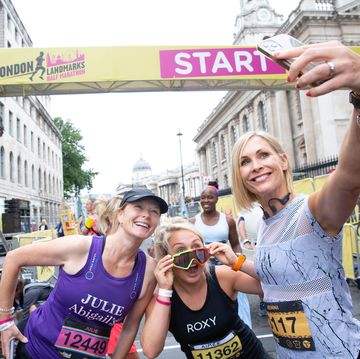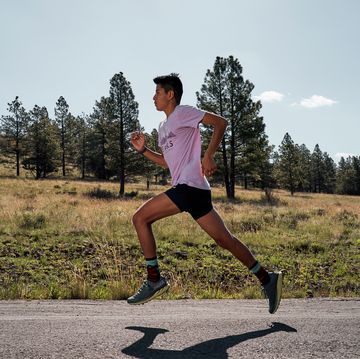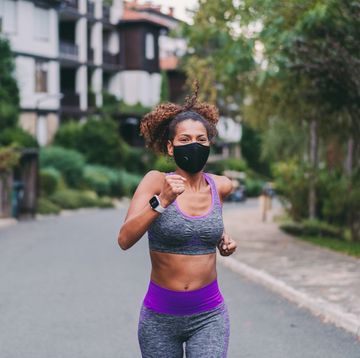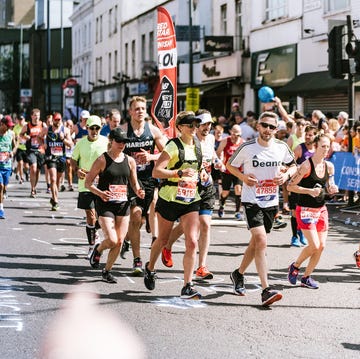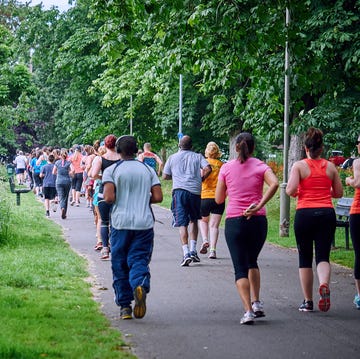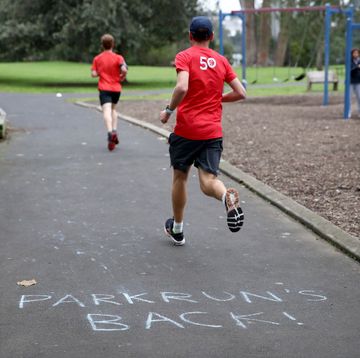COVID-19, a new form of coronavirus, is dominating the news. To date, nearly 100,000 people have been infected by the respiratory disease, which originated in China, with the number of UK cases recently surpassing 300. More than 3,300 people have died worldwide after contracting the virus.
It’s a worrying time for everyone, but for those who suffer from health anxiety and/or a form of obsessive compulsive disorder involving repetitive hand-washing to manage an obsessive fear of germs, it may feel particularly challenging.
The official advice from the World Health Organisation is to wash your hands with soap and hot water regularly for 20 seconds, or the time it takes to sing ‘Happy Birthday’ twice. This medically-informed advice is rightly being pushed by Prime Minister Boris Johnson in a bid to contain the coronavirus, but hearing it everywhere you go can be triggering.
Sara Dewhurst, 34 from the Ribble Valley near Manchester, used to suffer from health anxiety, also known as hypochondria, so badly that she would have regular panic attacks and avoid crowded public places. She learned how to manage her symptoms to the point that it barely affected her day-to-day life, but her old anxious thoughts have begun creeping back in since the coronavirus started spreading.
“I keep thinking, ‘What if I get sidetracked and forget to wash my hands and touch my mouth?’, ‘How ill will I get if I catch it?’ and ‘Will I die?’,” she says. “I have to work hard at keeping a rational grip on my anxiety, particularly when visiting cities or travelling on public transport.”
Ashley Fulwood, CEO of confirmed UK coronavirus cases, has been able to draw upon the coping techniques she adopted when she struggled with health anxiety before, such as body scanning and deep breathing.
So, if you’re finding things tough and aren’t sure how to manage your mental and physical symptoms, what can you do?
Focus on the facts, not the speculation
The charity No Panic, which helps people living with phobias, OCD and other anxiety-based disorders, told us that helpline calls and emails have jumped by 20 per cent since news of the coronavirus broke.
Professor Kevin Gournay from the Institute of Psychiatry, Psychology and Neuroscience at Kings College Hospital in London is president of No Panic. To reduce worry, he recommends curating your news sources and avoiding social media where possible.
“Focusing on the worst-case scenario only stops you enjoying the present moment,” he says. “Coronavirus does lead to deaths in a small proportion of the population (the mortality rate is currently at 3.4 per cent) but this is not Ebola or the Spanish flu.
“There have been 596 confirmed UK coronavirus cases among over 66 million people so far, meaning the chance of you catching it at all is currently minimal. Even if you did catch it, the vast majority of patients recover and many only experience mild symptoms.”
Professor Gourney blames “the proliferation of social media sites over the past decade” for the spread of panic-inducing rumours.
“News in all shapes and forms reaches many more people than it did 10 years ago,” he says. “Often, we only get a headline on our phones, which might be misleading and not give the whole picture. I would argue that if swine flu, which killed more than 200 people in the UK and infected thousands more, happened today, we would see much more panic than we did in 2009.”
He suggests reading the clear and informative coronavirus page on the NHS website, Resting heart rate (@CMO_England on Twitter), England’s chief medical officer and chief scientific adviser to the Department of Health and Social Care (@DHSCgovuk) Can you drink booze after the vaccine on the Government’s website.
Fortunately, Dewhurst, a psychotherapist and owner of OCD-UK, has experience of the disorder. He agrees that the media “all too frequently overemphasises the risks”, meaning professional advice becomes “open house to every intrusive thought OCD can throw at us”.
His charity has also seen an upsurge in support requests from people suffering from OCD who are experiencing an increase in obsessions in response to the threat of coronavirus.
“For many of our callers this is OCD rehashed in a new coronavirus-shaped fear,” he says, “but I have no doubt that the current emphasis on repeated hand-washing and avoiding shaking hands will lay seedlings for people yet to know the pain and misery of OCD.
“Many people, even those without OCD or health anxiety worries, have resorted to wearing face masks on public transport (which offer negligible benefits). That’s a fear-driven compulsion, but for now, at least, most likely won’t be at obsessive levels. But for those of us with OCD, we take things to a new level.
“Like with most OCD fears, there is a risk that’s relatively small, but OCD will inflate that to make it seem significantly higher than it actually is. The media are doing their best to scare us. Don’t let them or your OCD inflate the risk. Look at the stats.”
Notice and acknowledge how you're feeling
Don’t ignore your anxiety, hoping it’ll go away: confront it. Dewhurst recommends noticing any negative or irrational thoughts you may be having, such as “I always get ill”. She suggests keeping a thoughts journal and looking back at it when you’re in a more relaxed state.
“Challenge your thoughts and look for evidence around them,” she says. “For example, where is the evidence that you’re going to catch coronavirus? Start to reframe them as healthier thoughts with evidence, such as, ‘I have a strong immune system and there are things I can do to keep it strong’.
“The more you get to know your thoughts, the more power and control you will have over your health anxiety.”
No Panic has an audio clip on its website that will help you run a five-minute Study launches to track how Covid affects runners. Body scanning attunes you to the physical sensations of your body and can help you feel more grounded in the present moment, relaxing your mind and body during anxiety spikes.
Remember to breathe
Breathing is something we all take for granted but, when done mindfully, it can help alleviate physical symptoms of anxiety, such as a tight chest or headache. It’s easy to find breathing techniques online but for starters, Dewhurst advises “taking a deep breath in and feeling the tummy rise, followed by a long exhale feeling the tummy move back in”.
This ‘belly breathing’ means there should be little or no movement in your upper chest, unlike the shallow breathing synonymous with anxiety, which disrupts the balance of oxygen and carbon dioxide we need to feel at ease.
Talk about it openly
Consider sharing any worries about coronavirus with a friend, family member or therapist who may be able to help put your health anxiety into perspective and introduce you to some helpful new coping strategies.
Fulwood encourages OCD sufferers to get on with life as best they can, rather than waiting for intrusive thoughts to disappear.
“If you let it, OCD will stop you doing everything you care about and want to do in life, most significantly in building and developing relationships with friends and loves ones,” he says. “Because of OCD, right now we may be avoiding seeing family and friends, avoiding hugs, or avoiding doing and going to the places we enjoy.
“It’s important not to let OCD and the coronavirus limit our social circle because that social circle is also your support circle.”
Distract yourself in a healthy way
Distance your mind from your health anxiety by giving it something else to focus on. This may be a going for a run - exercise is a a great way to reduce stress and enjoy a dopamine hit and getting in 30 to 60 minutes of moderate to brisk activity can help your immune system keep viruses at bay. Here's a to get more articles like this delivered straight to your inbox.
Question your behaviour
For OCD sufferers with a fear of germs, it may be difficult to identify which hand-washing behaviours are ‘acceptable’ and recommended, and which are driven by OCD and anxiety. Health anxiety sufferers may be concerned about developing OCD as a result of an increased focus on hygiene.
“The key issue to look out for is function,” a spokesperson for OCD Action says. “For example, is your hand-washing being carried out for the recommended amount of time to reduce the risk of spreading the virus, or is it being done ritualistically in a specific order with the end goal of feeling comfortable or just right?”
OCD, which affects between 1 and 2 per cent of the population, is a treatable condition. The recommended treatments, according to OCD Action, are cognitive behavioural therapy (CBT) with exposure and response prevention (ERP) and medication.
It’s important to remember that there are many misconceptions surrounding OCD. Not everybody who suffers from the disorder has a fear of germs or a need to be neat and tidy; these may be symptoms for some people but the condition can manifest in a number of different ways.
“OCD is defined by obsessions and compulsions,” the charity’s spokesperson explains. “Obsessions are unwanted, intrusive thoughts, images or urges which cause anxiety. In order to try and alleviate that anxiety, people with OCD will carry out compulsions, which are mental or physical behaviours.
“These compulsions may temporarily relieve anxiety but they ultimately reinforce the original obsession and cause a vicious cycle to occur, which can become extremely time consuming and distressing.
“Common obsessions include, but are not limited to, fears of coming to harm or causing harm to others, sexual thoughts such as the fear of being a paedophile or acting sexually inappropriately, religious or blasphemous thoughts, or worries about your sexual identity. Common compulsions include reassurance-seeking, avoidance, rumination, counting or tapping and checking.”
Seek support from charities
Runners World, Part of the Hearst UK Wellbeing Network launched a new online page for people who are feeling anxious about coronavirus, who may have been asked to self-isolate and follow strict hygiene rules. It covers how to plan for staying at home, including adding structure and variety to your day, and how to manage rolling news coverage. It will be updated as the ongoing situation develops.
OCD Action, OCD-UK and No Panic encourage anybody who is worried to get in touch for further information, guidance and support.
This article is not intended as a substitute for medical or therapeutic advice. If you are suffering from health anxiety or OCD, we encourage you to contact Mind, No Panic, OCD-UK or OCD Action or seek professional help. If you suspect you may have coronavirus, call the NHS on 111.
Health & Injuries? Sign up to our newsletter How to run safely amid coronavirus concerns.



